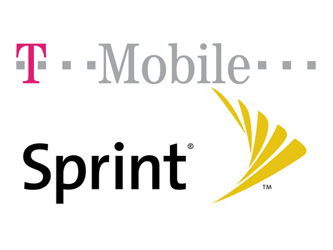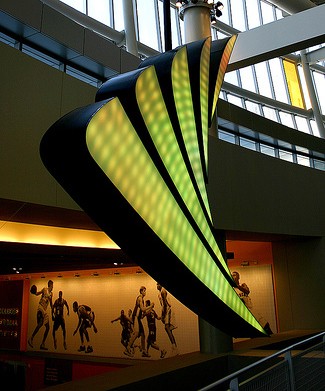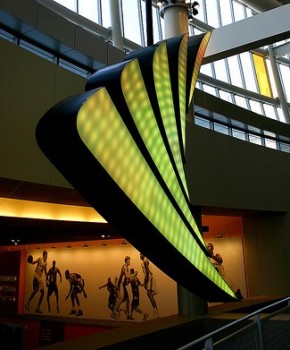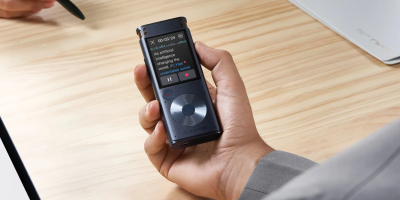Sprint had a better 2013 than they were expecting, but not all of their news might be good heading into the new year. The Overland Park, Kansas company has reported their Q4 2013 financial numbers, and were pleasantly surprised by the results.
Better, but not by much
After estimating they would lose more than 350,000 customers in the quarter, Sprint was actually able to add 58,000 new postpaid accounts in Q4 2013, bringing them up to a record 53.9 million overall.
That number may seem paltry and significant up against the 1.6 million recent additions by T-Mobile or the 1.7 million additions by Verizon, but considering Sprint has been hemorrhaging market share for nearly the entire year, it’s likely refreshing for them to see.
Sprint also sold 5.6 million smartphones last quarter — 600,000 more than Q3 — which totaled up to 20.5 million on the year. That said, the influx of new customers and strong smartphone sales didn’t keep the carrier from losing money, as they let over $1 billion slip through their fingers.
So there has to be some highlights in all of this right? Well, they did hit their goal of covering 200 million Americans with 4G LTE this past year, though that number isn’t quite impressive compared to AT&T and Verizon covering nearly the entire nation.
Sprint also considers the rollout of their new Framily plans a success, though whether that will end up being a good long-term move for securing more family plans remains to be seen. It’s the latest move that has the carrier trying to match wits with T-Mobile, who has been knocking it out of the park lately when it comes to compelling options (something which has been reflected in the company’s latest numbers).
Moving on from Magenta?
Behind closed doors, Sprint still contends that a purchase of T-Mobile would help them improve their network and eventually get out of the red, but it sounds like they’re starting to believe that it won’t be up to them. The company’s plans to propose a buyout of T-Mobile from Deutsche Telekom might be in jeopardy due to resistance from anti-trust regulators, and they could be close to backing out, the Wall Street Journal reports.

According to them, meetings between Sprint brass and anti-trust regulators (namely those in the FCC and the justice department) haven’t been positive, with the two sides meeting more opposition than they were expecting.
Sprint’s argument is that it would be better for one bigger carrier to take on the two US conglomerates known as AT&T and Verizon, but there are concerns that the disappearance of even just one major player will severely damage wireless competition in the country.
T-Mobile is no stranger to failed mergers, with the company’s sale to AT&T falling through for the very same reason back in 2011. That particular deal netted T-Mobile billions of dollars in cash, assets and spectrum, and gave them the capital they needed for the aggressive 4G LTE deployment currently being carried out.
Sprint’s hesitance to blindly jump into a buyout proposal isn’t unwarranted, as T-Mobile would likely impose the same stipulations they imposed on AT&T. Losing billions in a failed merger attempt didn’t put much of a hurting on AT&T’s pocket books, but Sprint doesn’t have quite the same clout and room to work with. This past quarter’s — and year’s — results don’t help their cause at all.
[via Sprint]












SO CAN DISH N GOOGLE GET BACK IN THE RACE?
Don’t think Tmobile users would like Dish any more than Sprint. Yes, it keeps 4 players but Dish doesn’t have any cash to expand network long term as Softbank does.
So who has the fundage to back T-Mo that would not cause a merger with any of the bigger 3? … and especially keep them threatening the other carriers with new things like they’ve been doing with “uncarrier”
million $ question
Even if dish and google were partners?
they took a big hit 2 weeks ago when my whole company left them “Comcast” that’s a lot of workers and a lot of phones lol
If they buy T-Mobile, they’ll lose a lot of customers. No way I’m sticking around under Sprint. They sucked over a decade ago when I left and I’ve not heard anyone else in my area say anything different to this day. (And I live in their hometown!)
The predicament for Sprint is you have to have a new Spark phone to take full advantage of network. Existing customers will not notice improvement unless getting new phone and may not know that, so leave.
Spark network is far better with building penetration than Tmobile and Sprint LTE coverage is way beyond Tmob now. Not even close anymore.
Nevertheless Sprint is expanding LTE greater than Tmobile. Sprint LTE reported by users. Yes, not 100% accurate and not good at street level but gives a good _indication_ where Sprint is expanding…
http://sensorly.com/map/4G/US/USA/Sprint/lte_310sprint
Tmobile reported by users..
http://sensorly.com/map/4G/US/USA/T-Mobile/lte_310260
No. T-Mobile still covers many more people with LTE than Sprint but HSPA+ 42 which is just as fast extends well beyond that offering the same speeds.
Yeah, I was talking LTE deployment. Although Sprint is growing LTE at a rate that it’s growing into some areas where Tmob doesn’t have any coverage at all, even voice.
And Sprint will expand 800Mhz in rural areas.
So if everyone’s adding customers, where are they all coming from?
I’m betting they are really device activations for all carriers, not necessarily new head count. IE, adding tablets to family accounts.
This is what they get for paying apple all of that money to get the iphone on their network. Dan Hesse seems like a nice guy but he really should have been fired a long time ago.
I dunno. Many people seem to forget how bad Sprint was getting, prior to Dan Hesse taking over.
Yeah…deploying WiMax then abandoning it and playing catch up to upgrade everything to LTE. Then spending $20 billion to get the iphone. Sounds like they might have been better off without him.
Again, I want to re-emphasize how bad Sprint was getting before…again, before he came on board. Deployment of WiMax vs. LTE, that was a risk that ended up being a bad decision, but it was a gamble that he was trying to make, in order to get the company out of the deep hole that the company was already in, prior to his coming on board. Spending $20 billion dollars on having the iPhone, I wouldn’t necessarily say that was a “bad” investment. Truth is, Sprint was offered the exclusive iPhone deal, prior to his being on board, and the former CEO passed…look what ended up happening. ATT benefited from Sprint’s prior CEO’s bad decision, simply because Apple would not allow any carrier to place their “proprietary” software on the iPhone. So, to a certain extent, Dan came in with the position of trying to fix prior “bad” decisions, with only the gamble of going WiMax as a decision that was under his belt. The iPhone deal would eventually have happened and as much money as was spent, there’s no way he could’ve anticipated the rapid growth and popularity of Android.
You’re right. Now that I think about it, Sprint’s networks hasn’t improved very much since Hesse has taken over. The $20 billion iphone investment is what will eventually put Sprint into bankruptcy. Android phones were already much more popular than iphone phones when sprint decided to give apple $20 billion.
I think he improved what he could, but realistically stepped onto a sinking ship. Just not sure how realistic it would be to expect anyone to fix a sinking ship. Only reason I have stayed so long is due to Sprint being the only network that works well at my house.
I like Android much more than iOS, but I still think that the investment (although too expensive) was worth it. To be the only carrier withOUT an iOS device would generate quite a bit of bad publicity. Maybe the powers that be over there were afraid that Android would rise and fall like WebOS did… though WebOS’s demise seemed more due to Palm not having enough money and poor decisions at HP.
Um it was Verizon ghat was offered the exclusive iPhone deal. They passed and at&t bit
You’re right. For some reason, I thought I remembered an article reading that Sprint and Verizon had passed, but that could’ve been a blog just speculating. Nonetheless, this is a recent article I read, where it explains what Dan Hesse was getting himself into, when he took over as CEO http://www.2machines.com/articles/165100.html. It took him until 2010 to just get the company out of the dark, so question is if he’ll be able to propel the company forward. So far, 4 years later, it might be too difficult a hill to conquer.
Verizon was not offered the iPhone either. That was a crazy rumor that got squashed. Apple only wanted to deal with a GSM device, which is why at&t was the only company in the US that they considered.
Nobody was offered the iPhone other than at&t, due to Apple only having a GSM model.
http://usatoday30.usatoday.com/tech/news/2007-01-28-verizon-iphone_x.htm
http://news.cnet.com/Verizon-Wireless-passed-on-iPhone-two-years-ago/2100-1041_3-6154287.html
That was from 2007. Read this http://www.phonearena.com/news/Verizon-CEO-says-that-the-carrier-never-had-a-shot-at-the-original-Apple-iPhone_id15983
I had read that interview article, when Verizon was being talked about actually offering the iPhone. Thing is, Verizon didn’t refute any of the articles, when it was being publicized all over the place in 2007 (when the iPhone first came out), so who knows whether or not what they told in 2011 (when they finally did offer a CDMA version) was the “truth.”
Think about it. There was not a single CDMA iPhone in the entire world until 2011, in the middle of a release cycle. Apple wanted it to be a GSM only device. They only considered a Verizon iPhone after they became the largest carrier after buying alltel. Apple and Verizon both have said that Verizon was not offered the iPhone. That was a crazy rumor. Apple is slow to adopt new tech, we know this. In the fall of 2011, they released the 3G only 4S, when Verizon had a lot of the country already covered with LTE.
When they went with ATT, and assuming it was due to their focusing on GSM, Apple had an exclusivity deal with ATT for 5 years.
http://www.engadget.com/2010/05/10/confirmed-apple-and-atandt-signed-five-year-iphone-exclusivity-de/
Steve Jobs had been reportedly wanting to get out of the exclusivity deal, multiple times, due to ATT’s slow progress on making the network faster:
http://bgr.com/2013/11/18/att-iphone-exclusivity-steve-jobs/
Why would there even be any talks of a CDMA version between 2007-2011? In the Engadget article, it talks about the California Class action lawsuit going up against the exclusivity deal that ATT had with Apple. There weren’t any reports of when the first year of exclusivity started, but there were reports in early 2010 stating that the end was around then, so it’s possible that the agreement for exclusivity started, even prior to the iPhone even launching in 2007.
http://www.businessinsider.com/henry-blodget-apple-to-end-att-iphone-exclusivity-on-wednesday-report-2010-1
The wimax deployment meant they got to keep a lot of spectrum the would have otherwise lost.
Would they have lost the spectrum, if they had focused on making it LTE though? From what I remember, execs from Sprint had clearly mentioned that, the reason they went with WiMax first was because it was a technology that was already being used (and supposedly successful) in other countries (Some parts of Asia and Europe already had WiMax running, prior to Sprint in the US). The other justification made by Sprint executives was that, should the WiMax 4G connectivity fail, switching to LTE would be “an easy transition.” That was what they stated, not my words, but of course…for those of us that are on Sprint, we’ve seen how long it’s taking for both “Network Vision” and LTE deployment. I live in one of the biggest markets and while I don’t have as “bad” an experience with Sprint as others in other areas of the country, I’m actually more concerned about their ability to deploy both upgrades, as well as LTE deployment in a “timely” manner. Now that they have started launching “Spark,” what was puzzling to me is the fact that they didn’t insist on Spark radios being installed in all of their flagship devices for 2014 (another short sided fail). I will be getting the last subsidized upgrade in a few months. Should Sprint not drastically improve by 2016, I’m likely switching to Verizon.
There wasn’t LTE equipment ready for deployment at the time. We are talking about four years ago.
Sprint never initially intended on switching to LTE. The impression they gave was that WiMax would prove to have faster speeds and better building penetration than LTE. Dan Hesse said that:
http://www.electronista.com/articles/10/10/31/sprint.ceo.says.wimax.its.only.4g.choice/
Had they made the choice of going with LTE earlier on, they might have had equipment ready for deployment. They had already mentioned that, should WiMax prove to not work like they intended, then the switch to LTE would be “easy.” Verizon made the LTE choice early on and announced that in October 2010 (when Sprint was slowly deploying WiMax), and then formally announced deployment for their LTE network in December:
http://www.verizonwireless.com/news/article/2010/12/pr2010-11-30a.html
Half way through 2011, Verizon was already kicking Sprint’s butt with speed and LTE deployment (as compared to Sprint’s slow Wimax deployment) and in October 2011, Sprint made the announcement that they’d be switching to LTE:
http://www.brighthand.com/default.asp?newsID=18256&news=Sprint+LTE+4G+WiMAX
So, really, it had nothing to do with LTE equipment not being ready. Sprint just made the wrong choice in going with WiMax first and it hurt their growth. So, when they announced “Network Vision” which was intended to improve the 3G towers, in conjunction with deployment of their LTE towers…that put them WAY behind the 8 ball.
What? They gave Apple $20 billion? Talk about fleecing.
They need to rethink it.
They argued that AT&T couldn’t have it… we need 4 carriers.
Now they want it….
Sprint’s logic defies me.
Sprint should of use all those cash too improve their network.
Sprint should exit the retail business and simply be a mass minute bundler to Boost, Virgin, etc. Their wholesale customers get better terms and service than Sprint’s own subscribers. And after 10 years of empty promises about their crap network we can admit it’s bullshit and they’ll never improve.